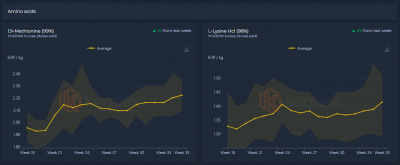dsm-firmenich looks to restructure vitamin asset footprint, reduce costs

The challenging conditions in vitamin activities that it already flagged earlier in the year have further deteriorated this month, affecting both pricing and volumes, contrary to what the Swiss-Dutch group had expected.
In response, the company said it has decided to accelerate a series of actions to restructure its vitamin business, as it tries to lessen its exposure to market and earnings volatility.
Vitamin footprint
The company believes those actions will allow it to achieve its mid-term financial targets, and they include the following:
- Restructuring of the vitamin asset footprint, significantly reducing costs. This includes the closure of the Xinghuo vitamin B6 plant in China and the refocusing of the company's vitamin C activities on its specialty Quali-C from Dalry, UK only. The production of vitamin C in Jiangshan, China, which had already been significantly reduced since the end of 2022, was completely shut down in mid-May; the company said it is exploring a range of options for the Jiangshan site including partnerships or the repurposing of the manufacturing assets.
- Creating a new separate vitamin unit within ANH that will be tailored to the changed market dynamics. “This will result in a simpler, more responsive 'go-to-market' model, and a more efficient and agile organization.”
- Reducing working capital/inventories, with extended shutdowns of the vitamin A and E plants in Sisseln in Switzerland, scheduled for Q3 2023.
- Establishing a new senior executive role, vitamin transformation program director, to deliver these performance plans, directly reporting to the CEO.
- Accelerating the growth of ANH in its higher-margin performance solutions and precision services businesses, tackling some of the biggest challenges related to sustainable food chains, while optimizing its vitamin offerings, using its strong premix base.
Combined, all these actions are expected to result in an estimated saving of around €200m per year, with the full run rate to be reached by the end of 2024, said dsm-firmenich.
Further to those measures, the Pinova ingredients plant in Georgia, US, part of the perfumery and beauty business unit, which was seriously damaged by a fire in April 2023, will not be re-opened. The company will try, where feasible, to secure the supply of these ingredients by leveraging other production units.
Outlook
Given the current weak macro-economic outlook, the company said it does not anticipate a material improvement in business conditions in the second half of 2023. “Vitamin prices are expected to remain at low levels through to the end of the year, with some ongoing destocking through the value chain across its business,” it noted.
As a result, dsm-firmenich estimates a FY 2023 (pro forma) adjusted EBITDA of between €1,800–1,900m (versus €2,275m for FY 2022).
Within this, the company estimates a negative vitamin effect on full year adjusted EBITDA of about €400m as well as a negative foreign exchange effect for dsm-firmenich of about €100m. “The vitamin effect has been exacerbated by high vitamin inventories, produced at elevated costs, delaying the expected positive impact from lower input costs in H2 2023.”
Potential buyers
The weaker results for vitamins and ANH were not a surprise to anybody following markets and trade volumes, yet the magnitude and weaker guidance certainly was, said Stefan Schmidinger, chief economist, Kemiex.
Ingredients markets have already witnessed a handful of sporadic profit warnings, and it is not improbable that additional updates on portfolio realignments, or divestments will be issued in the near future, he believes.
“Industry experts are now also discussing who will be a buyer of DSM’s and other distressed assets. Speculation about bolt-on acquisitions ranges from larger Chinese manufacturing groups, with strategic supply agreements to DSM attached, to large global end users or distributors of vitamin C or B6 who can benefit from captive supply. Standalone private equity seems less likely for these competitive products and single factories," he told FeedNavigator.













